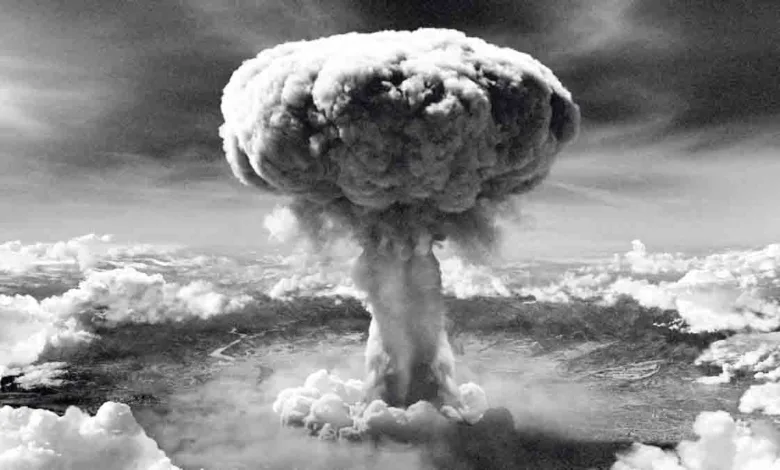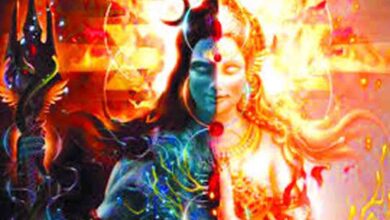Oppenheimer, Bhagvad Gita and the atom bomb

GUEST COLUMN
 Vir Singh
Vir Singh
Fifty-six years ago, a scientific genius who awarded humanity with the atomic bomb and brought the world to its knees with a pile of nuclear explosives, illuminated by the wisdom of the Bhagavad Gita, left the world. But a film revived him and made him a hero in the modern world. The American theoretical physicist and father of the atomic bomb, Julius Robert Oppenheimer, has been portrayed by the renowned filmmaker Christopher Nolan in his biographical thriller film “Oppenheimer,” aiming to ignite contemporary consciousness.
In the depths of human consciousness lies a profound natural desire to peek into the origin of any process. That is why we are history lovers by our very nature. From the origin of humankind to the birth of the universe, various imaginations inhabit our minds. The emergence of the atomic bomb and its consequences not only fascinated the human race but also stirred the desire to explore the history of the creation of a cataclysmic weapon that could lead the entire living world to the brink of destruction. “Oppenheimer” seeks to fulfill this very desire.
The Manhattan Project, focused on the development of atomic bombs to achieve victory over Nazi Germany, was a highly secretive initiative of the United States. In this project, the US brought together many renowned scientists, with J Robert Oppenheimer being the most prominent among them. The group of scientists was famously known as the Los Alamos Laboratory with Oppenheimer as its director. Oppenheimer conducted the first test of the atomic bomb on July 16, 1945, known as the Trinity test in New Mexico, USA. This test successfully detonated the world’s first nuclear bomb. Following this test, Oppenheimer took charge of the production and development of atomic bombs and later became a hero of nuclear warfare worldwide.
During the atomic bomb test, Oppenheimer quoted a verse from the Bhagavad Gita, reflecting on its self-destructive power. After the test, his colleague, Niels Bohr, engaged in a dialogue with him, during which Oppenheimer recited a verse from Chapter 11 of the Bhagavad Gita, verse 32:
कालोऽस्मि लोकक्षयकृत् प्रवृद्धो लोकान्समाहर्तुमिह प्रवृत्तः। ऋतेऽपि त्वां न भविष्यन्ति सर्वे येऽवस्थिताः प्रत्यनीकेषु योधाः॥
In this verse, Lord Krishna is showing Arjuna his universal form, stating that he is time, the destroyer of worlds, who has come to consume all living beings. Even without your participation, all the warriors present on both sides will cease to exist.
This profound experience led Oppenheimer to undergo a significant transformation in his life. The events of Hiroshima and Nagasaki deeply affected his psyche, prompting him to contemplate new possibilities in his life.
The bombings of Hiroshima and Nagasaki on August 6 and 9, 1945, respectively, with the “Little Boy” and “Fat Man” bombs dropped by the United States, demonstrated the trailer of the destruction of humanity by humanity. This annihilation had a profound impact on Oppenheimer’s life. He expressed deep empathy for these events and was inspired to stand for justice. After the atomic bomb test, he was caught in an internal struggle between sensitivity and cruelty. He continued to focus on advocating for justice and peaceful solutions on a global scale amidst the rising production of more powerful atom bombs. He later expressed remorse for his involvement in ruthless and oppressive activities and sought forgiveness for his complicity in bomb development during his tenure. By quoting the verse from the Bhagavad Gita, Oppenheimer revealed his inner turmoil during a critical moment in his life when he fought his internal battles between sensitivity and brutality.
Oppenheimer died on February 18, 1967, due to throat cancer. During the twilight of his life, he spent time with people around him discussing the bombings and reviewing different aspects of his life.
The philosophical energy of the Bhagavad Gita and the devastation of Hiroshima and Nagasaki gave him a new perspective on humanity and scientific research. After these events, he addressed the world to express his responses to the global scenario. The combination of personal and social experiences left an unforgettable impact on his life. In essence, Oppenheimer played the role of a modern-day Arjuna in raising his voice against the unjust Duryodhanas of his time and creating an environment of peace and creation after the era of world wars, which the Bhagavad Gita had taught him.
(The author is professor emeritus of environmental science, GB Pant University of Agriculture and Technology. Views expressed are personal)






